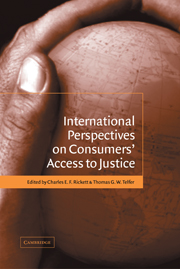Book contents
- Frontmatter
- Contents
- List of contributors
- Preface
- Table of cases
- Table of statutes
- 1 Consumers' access to justice: an introduction
- Part I Perspectives on consumers' access to justice
- Part II Issues in contract and tort
- Part III Services and the consumer
- 7 Services of general interest and European private law
- 8 The new Financial Ombudsman Service in the United Kingdom: has the second generation got it right?
- 9 Economic appraisals of rulemaking in the new society: why, how, and what does it mean? The challenge for the consumer
- Part IV Consumer bankruptcy law
- Part V Procedure and process issues
- Part VI Conflict of laws issues
- Index
9 - Economic appraisals of rulemaking in the new society: why, how, and what does it mean? The challenge for the consumer
from Part III - Services and the consumer
Published online by Cambridge University Press: 11 July 2009
- Frontmatter
- Contents
- List of contributors
- Preface
- Table of cases
- Table of statutes
- 1 Consumers' access to justice: an introduction
- Part I Perspectives on consumers' access to justice
- Part II Issues in contract and tort
- Part III Services and the consumer
- 7 Services of general interest and European private law
- 8 The new Financial Ombudsman Service in the United Kingdom: has the second generation got it right?
- 9 Economic appraisals of rulemaking in the new society: why, how, and what does it mean? The challenge for the consumer
- Part IV Consumer bankruptcy law
- Part V Procedure and process issues
- Part VI Conflict of laws issues
- Index
Summary
Introduction
By the mid-1980s there was already a fully fledged, and very significant, market in financial services in the UK. This sector (loosely encompassing banking, insurance and securities) was regulated through a mix of some limited statutory regulation (for example, brokers) but primarily through an informal ‘gentlemen's club’ model of self-regulation. In 1986 the Thatcher Government replaced this by a formal bureaucratic regulatory structure consisting of formally recognised self-regulatory organisations operating under a statutory umbrella body known as the Securities and Investment Board (‘the SIB’).
The reasons for this reform were primarily market related: the internationalisation of the financial services sector, particularly the entry of foreign businesses into the UK after the removal of certain anti-competitive structures, and the government's desire to widen the share ownership base. Foreign businesses could not necessarily be relied upon to adopt the norms of the British ‘gentlemen's club’. Equally, UK private citizens could not be expected to go where they had never gone before into stocks and shares unless they were convinced the market was ‘safe’, particularly after the financial scandals that occurred in the late 1970s and early 1980s. A new structure was needed to ensure that new players in particular adopted certain standards, and to reassure the private investor that the market was clean and safe. The financial services sector was too important to the UK economy to risk having its reputation tarnished.
- Type
- Chapter
- Information
- International Perspectives on Consumers' Access to Justice , pp. 196 - 228Publisher: Cambridge University PressPrint publication year: 2003



